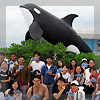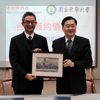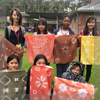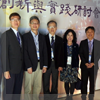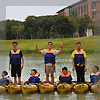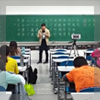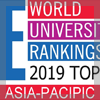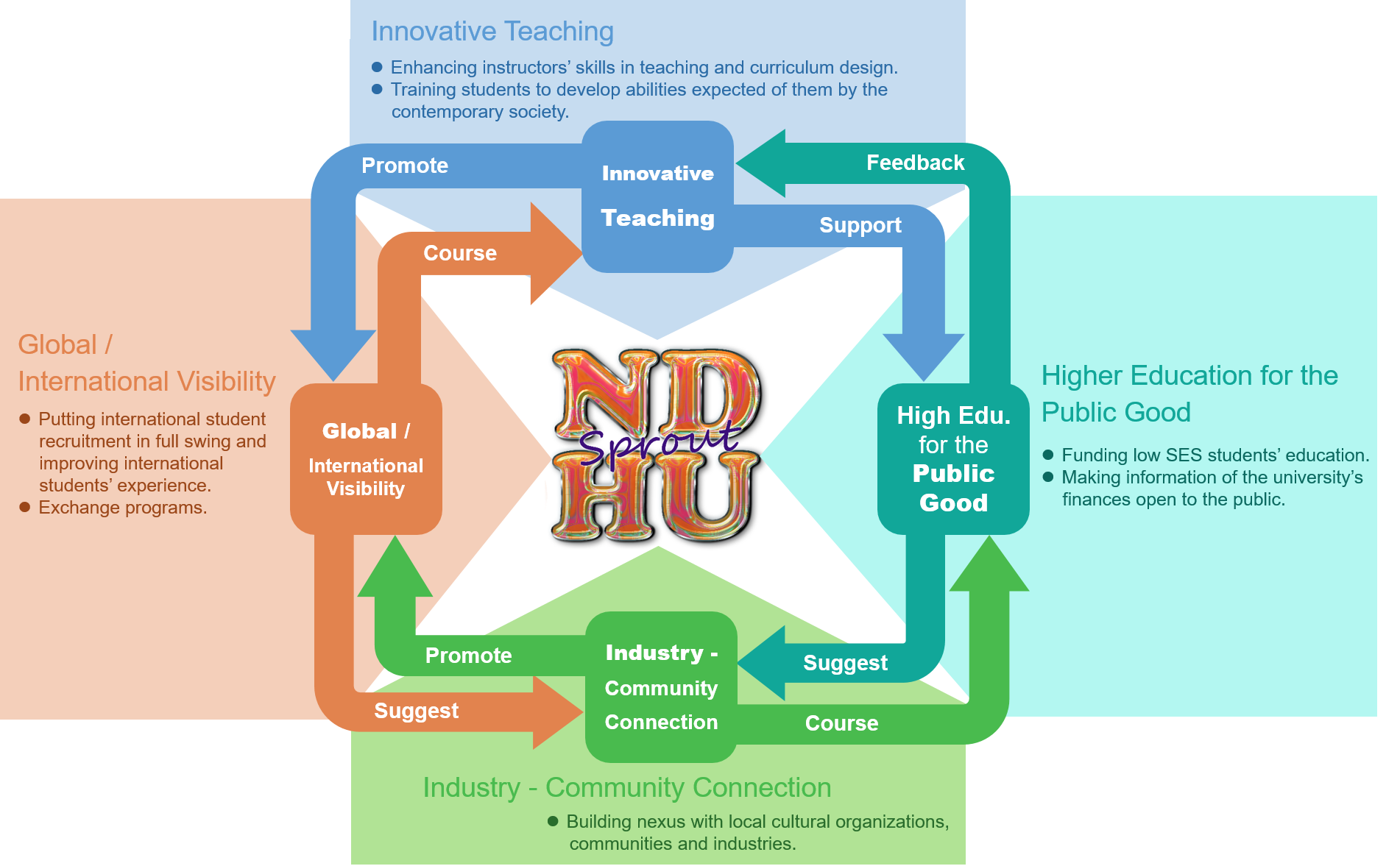
 NDHU Higher Education Sprout Project
NDHU Higher Education Sprout Project
 English Portfolio
English Portfolio
| Innovative Teaching |
|
The first objective is putting innovative teaching into practice. In order to enhance instructors’ skills in teaching and curriculum design, university promote serval projects to encourage professors to put the creativity, innovation and entrepreneur factors into their classes. For training students to develop abilities expected of them by the contemporary society, self-motivated learning project assists self-designed independent students to build teams to pursue their own ideas into reality.
|
| Higher Education for the Public Good |
|
The second thing is to place more stress on the public-good nature of higher education. Percentage of low socioeconomic status (SES) student in NDHU is about 14% in 2019. We have the responsibility to offer adequate resources for better learning experience to these students. I can fly supporting group (ICF) provide mentors’ assistance and counseling for students to have better adjustment on campus. Study grant reduces the SES student economic pressure and increase their experience of learning from doing. Due to make higher education database open to the public, NDHU manage an institutional research (IR) team to establish a data storage system which can collect and analysis data from students, staff and other activities in campus. So that can help school to improve its decision making process.
|
| Industry - Community Connection |
|
The social responsibility of NDHU is to build nexus with local elementary/middle schools, cultural organizations, communities and industries. Through the participation in social issue, educational service and industry needs, NDHU students and staff get attention on all aspects in Hualien area. For example, each summer and winter vacation, NDHU team up with local school to hold reading, science, and physical education camp, it can bring new and rich education resource into communities. Moreover, NDHU Industrial Innovation-lncubation Center assisted 26 student teams to participate internal and external competitions in 2019. One of them received subsidies each year in the U-Start Innovation and Entrepreneurship Program of the Youth Department of the Ministry of Education.
|
| Global / International Visibility |
|
To make NDHU global visibility, the following projects have been well organized.
Sticking on the Sustainable Development Goals (SDGs) to ensure NDHU is a partner of international community. Provide more exchange programs with abroad colleges to improve intercultural exchange on campus. Providing better English-taught, Chinese language courses, and cultural activities assist international students merged with campus life. In fall semester 2019, NDHU oversea students had come to thousand who were from about 50 different countries.
|
 English Report
English Report
NDHU embraces innovative teaching, higher education for the public, industry-community connection and global/international visibility to create a sustainable and livable campus. The university has gained deeper insights into the learning needs of students and has formulated various nursery programs by relying on teaching creativity, application of digital technologies, and innovative teaching approaches. Public education activities are organized in line with the utilization of management science to further adaptive career development. Teaching quality is deepened via institutional research with learning data. In the field of social responsibility, NDHU cultivates the civic literacy of its students. Socio-technology is utilized to develop local helpfulness and placemaking in Hualien. The university actively promotes an international outlook and makes optimal use of information technology to create a learning environment universe and to realize learning ubiquity with the ultimate goal of building a sustainable and livable campus conducive to learning.
Pioneering courses based on the concepts of innovation, creativity, and entrepreneurship that encourage instructors to make the full connection with local organization to rich the teaching contents. Students have the opportunities to be actively involved in and gain first-hand practical experiences from the area of humanistic care for local communities, and further facilitate the cultivation of professional talent in line with industry needs. Vertically Integrated Projects (VIP) Program that faculties create projects around their scholarly interests to team up long-term, large-scale and multi-disciplinary teams. Students can develop their potentialities of scholarship and exploration through those project teams. Online learning is employed to bridge the gaps from traditional learning models. Digital courses, of which the design is centered upon topics of specialty courses, are made available as extracurricular autonomous learning for non-university members (including foreigners) and senior high school students. The goal is to satisfy the needs of students in the field of autonomous and interdisciplinary learning and thereby enhance learning results and efficiency.
In order to promote faculty community and student learning autonomy programs. Instructors and students are encouraged to form peer groups for the discussion of topics of mutual interest. The NDHU faculty community encourages faculty members from different disciplines or industry instructors to form communities and jointly offer interdisciplinary courses with the incorporation of new industry knowledge.
Student learning autonomy aim to guide students in the application of knowledge and skills acquired in their courses and motivate them to extend their personal interests and take the initiative in implementing local service practices. Students plan and execute various activities under the guidance of supervisor and thereby achieve the triple effect of learning by doing, doing by learning, and in depth cross-disciplinary thinking.
In 2020, NDHU had 110 Pioneering courses, 13 VIP teams, 33 faculty communities, 76 student autonomous learning communities and online courses had been enrolled 1127 times by senior high school students. These experiments not only help us to explore any possibility of teaching innovation but also accumulate the energy for the transformation of future education.
Based on United Nations Sustainable Development Goals (SDG), end poverty in all its forms everywhere (Goal 1), ensure inclusive and equitable quality education and promote lifelong learning opportunities for all (Goal 4), and promote sustained, inclusive and sustainable economic growth, full and productive employment and decent work for all (Goal 8), workshop trainings of the 2020 project were focused on the skills of communication and expression, interpersonal Interaction, and lifelong learning. We organized potentials development project that have 1028 low socio-economic status (SES) students got involved with these training activities. There were 64 supporting groups from 23 departments provided mentors to assistance and counsel 206 SES students to have better adjustment on campus.
The database of pioneering courses, faculty community and student autonomous learning community programs had been visualized by institutional research (IR) team(https://reurl.cc/GdrVNZ). Moreover, report of student’s University Career and Competency Assessment Network (UCAN) also had been established to provide colleges more understanding of student needs(https://reurl.cc/GdrVNZ). The analysis of those data storage can help school to improve its decision making process.
NDHU relies on the professional expertise of all colleges to connect diverse cultures and ethnic groups as well as humanistic, social, and environmental spheres and implement practices in the following three categories: local social practice, educational practice in remote areas, and industry talent cultivation.
With regard to local social practice, we have established a Humanistic Innovation & Social Practice Base in Fuli Township in Hualien County and have designed local social practice courses based on seven course development trajectories and three corresponding course cluster dimensions. Students are brought into contact with communities in a series of intensive courses involving residential learning with local linkages. They engage in innovative learning including autonomous learning, observation experiences, teamwork and social practice. Co-learning courses (e.g., indigenous pottery, cultural learning, indigenous rituals and culinary culture) in tribal communities are offered to pass on indigenous culture. This also includes classroom activities in Puyuma, Saisiat, Rukai and Bunun communities. Indigenous pottery courses cover the whole process from gathering clay, kneading and pinching and firing to the exhibition of finished pottery pieces. These activities serve the purpose of activating indigenous cultural assets and developing multi-literacy and practical competencies.
In the field of educational practice in remote areas, we strive to strengthen the scientific and practical competencies. Scientific inquiry and practice competencies are emphasized in the 2019 curriculum guidelines. We have organized popular science camps, which combine inquiry and practice, to assist natural science teachers in remote areas at the senior high, junior high, and elementary school levels in the successful development of practice-oriented courses and the provision of guidance for students in inquiry- and practice-oriented activities. In addition, students’ horizons have been expanded and teaching competencies have been strengthened through reading and practical activities in remote areas, the dissemination and promotion of popular science, and adventure education. The goal is to enhance the university’s contribution to local communities and society and thereby improve the professional competencies of teachers and students and generate deep-rooted local links.
With respect to professional talent cultivation, we have developed an oncampus entrepreneurship database through external links to industry-government-academia-research collaboration activities and relevant industries. Training courses and seminars are organized to incorporate innovation-, creativity-, and entrepreneurship-oriented courses into learning spheres and thereby increase the width and depth of knowledge and the practical experiences of students. We aim to broaden the international outlook and deepen the local links of our students through participation in national and international competitions. We also provide our students with internship opportunities, multi-dimensional competencies, and guidance and counseling in addition to developing their problem-solving skills. If students intend to create startups or run a business, the NDHU Industrial Innovation – Incubation Center offers in-depth guidance, different activities, and industry advice to achieve positive results in the field of industry-academia collaboration
COVIE-19 had disrupted virtually all aspects of higher education in 2020. NDHU made the connection with oversea schools though the online promotions, recruitments and expositions with Indonesia, Malaysia, Mongolia, Canada, UK and so on. At the same time, we have intensified US-Taiwan cooperation in the field of higher education by concluding a cooperative agreement with the Foundation for Scholarly Exchange (Fulbright Taiwan). Since 2021, the project provides American students one year Chinese language course and two years graduate study in Department of Ethnic Relations and Cultures. The Times Higher Education announced its 2021 World Ranking of Academic Performance in 2020. NDHU had well performance in the field of Computer Science ranked as 5th high, Engineering ranked as 9th high and Physical Science ranked as 11th high in Taiwan.


